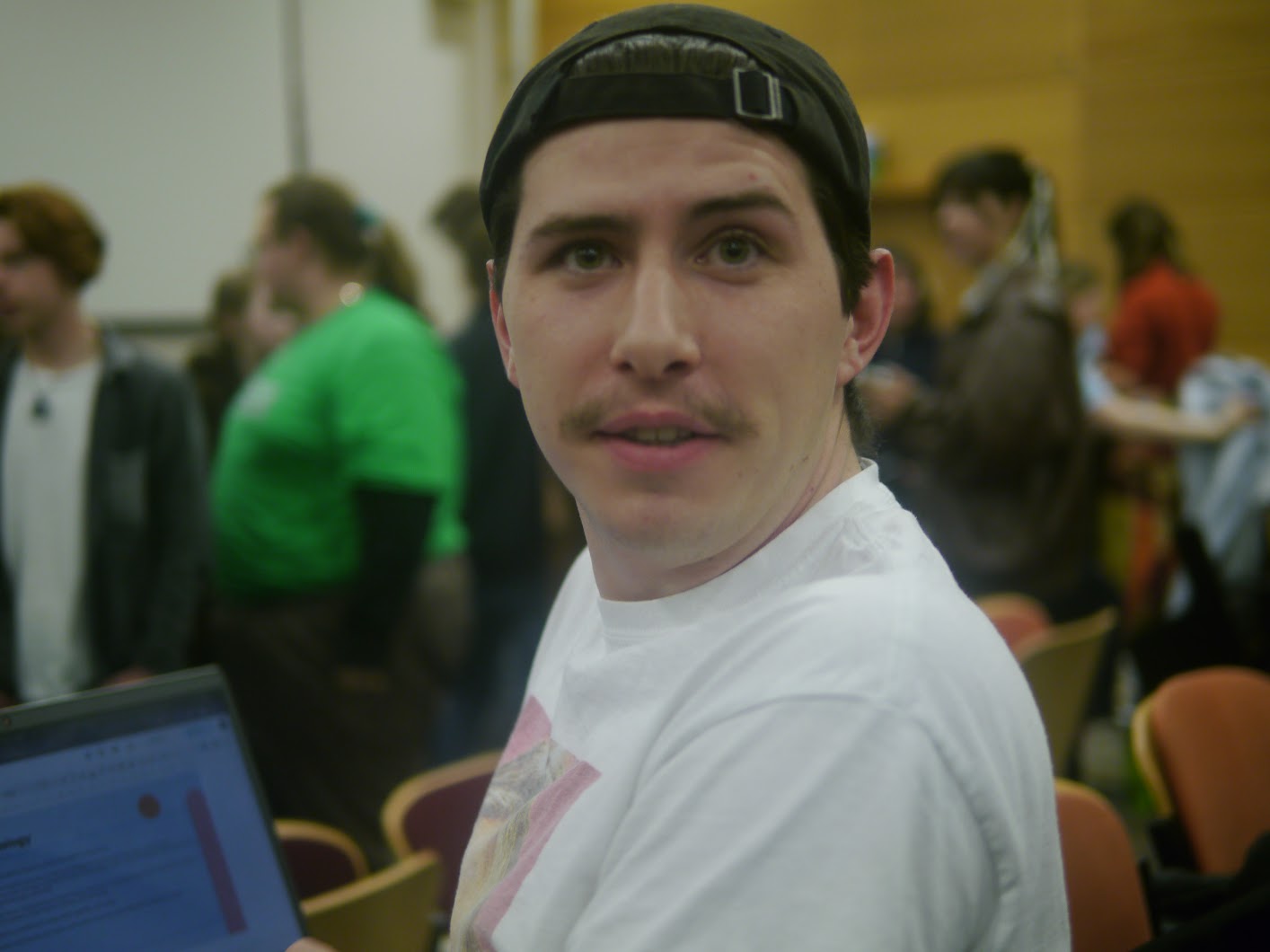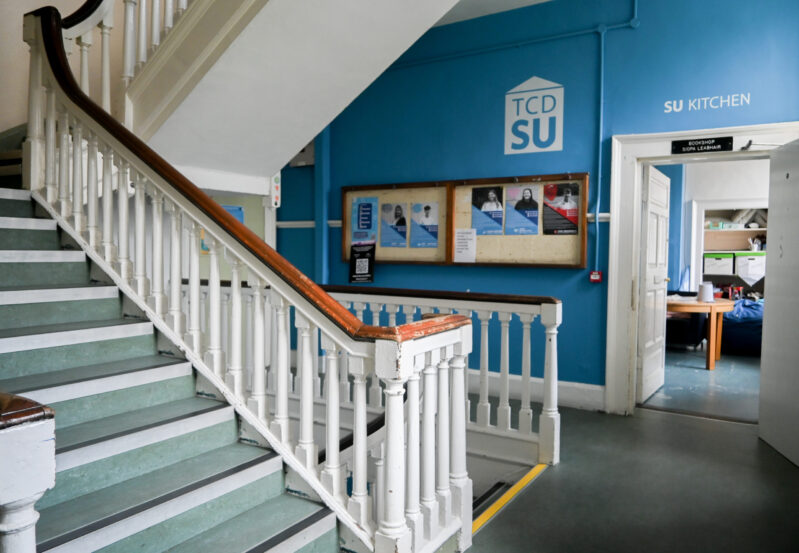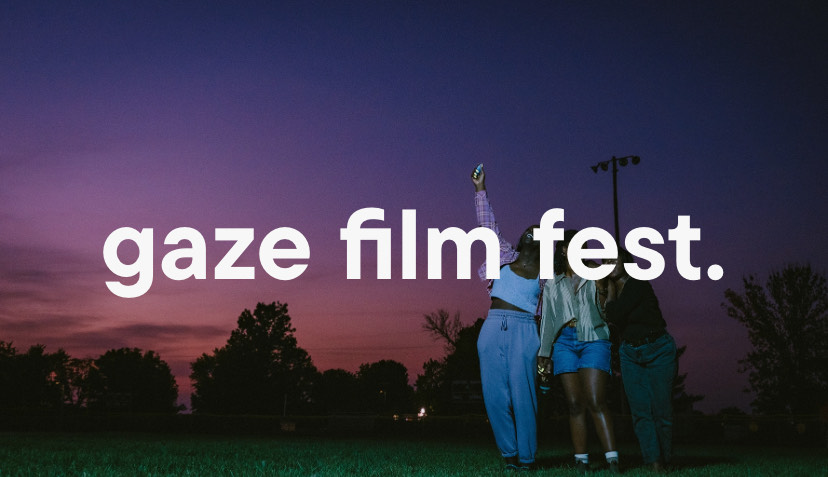Relying on a supposed message of happiness, Nathan Harrington, running to be next year’s Welfare & Equality Officer of the Trinity College Dublin Students’ Union (TCDSU), sat down with The University Times to discuss his singular approach to what has turned into a controversial campaign.
“I’m running for Welfare & Equality Officer to make everyone in Trinity a little bit happier”, Harrington began. “If, actually when, I get elected”, he would bring his experience as a Scout Leader, a sports club coach and a volunteer with Trinity’s S2S mentoring scheme, as well as the training the incoming Welfare & Equality Officer receives, to the role in dealing with the “day-to-day casework stuff”.
On a more personal note, Harrington said: “I feel, and I’ve heard, that people aren’t as happy as they could be… and so I think that has really spurred me on to try and do something about that.”
From his manifesto, in which he claims he is “seriously committed to bettering the welfare of Trinity students”, it is difficult to see how Harrington plans to be successful in his race for the role of Welfare and Equality Officer given that it is a position concerned with respect, dignity and inclusivity.
“If, actually when, I get elected…”
He makes various pledges, from using his entire salary to buy sweets and chocolate for students to bringing religious groups in to talk about welfare — “to incite arguments”. He also promises to create priority fire escapes for “disableds” and install shower curtains in mens’ changing rooms “so we don’t all have to see each others’ willies”.
Since launching his campaign, the TCDSU Electoral Commission have asked him to remove the term “disableds”, the phrase “to incite arguments” and the exclamation “fuck ‘em”, which was referring to students off-campus. He didn’t see them voting for him as he is running against the current TCDSU Off-Campus Officer, Hannah McAuley, but admitted: “I’d appreciate it if they [off-campus students] did, however.”
This seeming hypocrisy was evident when asked about the recent TCDSU campaign to fund period products on campus. Harrington said, “obviously it’s not as important to me as it is to other people”, presumably pointing out the fact that he does not use period products, and others do. Harrington went on to concede that if it is important to the student body “then it would be of the utmost importance to me, I would constantly be on top of that”.
Established by former Welfare and Equality Officer, Chloe Staunton, and further proposed to College Board by current incumbent Aoife Bennett, TCDSU’s free period product scheme was described by Harrington as having “fizzled out”. He believes it has “lost a lot of traction” but that he would put a lot of energy into “reinvigorating” it.
“I’m not saying I’m going to take people in wheelchairs and throw them down a rubber mat. Unless, well, I might if they wanted me to.”
In praise of Staunton and Bennett, he thinks that they have been “pretty good” at being Welfare and Equality Officer, but seemed to criticise them in engaging in activities he perceived as outside the role’s remit: “If I was put in the role I wouldn’t worry too much about other things that could distract me… the role of the Welfare and Equality Officer is, primarily, welfare and equality.”
Asked to define welfare, he said: “There’s a lot of work, casework, students accessing services for their physical and mental health.” He says “the role comes down to tying the two aspects together”, defining equality as “a whole different world of representation and supports”.
His idea of support for people with disabilities became evident when asked about why he saw a slip ‘n’ slide as a suitable activity for “disableds” in his campaign video: “It’s very hard to not enjoy a slip ‘n’ slide.”
“I’m not saying I’m going to take people in wheelchairs and throw them down a rubber mat. Unless, well, I might if they wanted me to. I have no issue with that…[but] it wouldn’t be the only disabled-friendly thing I would put in.”
“It’s important to not have, you know, the women’s society and then all the women go and hang out with other women… it’s important to bring people together.”
Asked why he used the term “disableds” in his campaign material, Harrington explained: “When I originally wrote my manifesto I was working with my big campaign team and within that group there are disabled people, people with disabilities, disableds, whatever you want to call them.”
“We decided on ‘adjective-first’ language, so not people with disabilities but disabled people, because that is how they felt most represented… disableds was short-hand for that.” In being asked to change the term “disableds” to “people with disabilities”, he said: “Obviously some people feel one way and some people feel very strongly another way”.
Speaking more broadly about representation for minorities and groups of people with protected characteristics on campus, Harrington said he would “give them a home”. He added: “I think there is a space for lots of different little groups. I think that they can find themselves within that group or within that space very easily.”
Using an unspecified “women’s society” as an example, he said he wants the Students’ Union to help these “little groups” work together more and be more inclusive: “It’s important to not have, you know, the women’s society and then all the women go and hang out with other women… it’s important to bring people together.”
“I could consider all sex to be queer sex… It’s not just about the people involved or the activities you’re doing, it is about both at once.”
There is no “women’s society” at Trinity, but one possible interpretation of his the European branch of The Women’s Network at Trinity College Dublin, which India O’Donohoe, the current chairperson, has previously described as “a space where women and gender minorities are able to network with each other and achieve a more equal foundation when it comes to entering the workforce”.
His manifesto also pledges to establish “LGBTQIA+ lectures to teach people how to have queer sex”, with “demonstrations and practice sessions to be made available”.
Asked how he defines “queer sex”, Harrington said: “I could consider all sex to be queer sex… It’s not just about the people involved or the activities you’re doing, it is about both at once.”
He explained the idea of “demonstrations” by saying: “I think that I would try to include and incorporate as many different types and forms of sex as possible to educate people the most about everything.”
“That’s not necessarily to say that the only interesting thing about gay people is that they have gay sex…”
It was put to Harrington that with no other mention of the LGBTQIA+ community in his manifesto, his mention of “queer sex” risked characterising this group by sexual acts, a technique which has been used to stigmatise and discriminate the LGBTQIA+ community.
In response, he said that “for queer people, it doesn’t really exist before you go to College”, also saying that “in Ireland there isn’t any queer sex on the curriculum”. “That’s not necessarily to say that the only interesting thing about gay people is that they have gay sex”, he concluded.
Harrington was also asked to remove the phrase “incite arguments” from his manifesto, in reference to the reason why he wanted to bring “religious groups onto campus to discuss welfare”. He explained: “Arguments are designed to find what people agree on.”
If religious groups came to discuss welfare, Harrington believes they would “boil down” discussions to such agreements as “a bit of mindful meditation is good for everyone”, arguing “a lot of people find solace in spirituality”.
At the first hustings of the campaign he made a comment claiming that using his Sabbatical Officer salary to buy sweets and chocolate for students would go further than donating it to a food bank drew gasps from the crowd. In explanation, he said: “There was a certain demographic in the room who understood that that was quite a tongue in cheek comment… and definitely a demographic that didn’t and who thought that was completely serious… I’d like to know what is going on in the head of someone who thinks that I actually think that.”
“That point in my manifesto is more about opening the door to the possibility of donating my salary to a good cause to help people on campus… to help people on campus, it’s a promise to care for other people in Trinity. If they vote for me I will give back to them.”
At the final hustings of the first week of campaigning, the Empower the Voice campaign group, which “spotlights the innovative vision and lived experiences of people of marginalised genders worldwide”, staged a demonstration accusing Harrington of mocking marginalised groups.
Harrington responded, in a statement to The University Times, saying: “i [sic] am not a homophobe, nor am i [sic] an ableist, marginalised-group basher”.
It remains to be seen whether Harrington will find support amongst the students whom he wishes to represent. He concluded the interview with a message for voters: “Please consider voting for me.”







